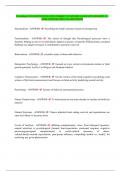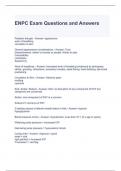Psychology (101) QUESTIONS AND CORRECT ANSWERS (ALREADY GRADED A+)
(2024 UPDATE) 100% GUARANTEED
Structuralism - ANSWER- describing the mind's structure based on introspection
Functionalism - ANSWER- The school of thought that Psychological processes have a
function: helping us survive as individuals, adapt as a species. Created by William James, assumed
thinking was adaptive because it contributed to ancestor's survival
Behaviorism - ANSWER- scientific study of observable behavior
Humanistic Psychology - ANSWER- focused on ways current environments nurture or limit
growth potential. Led by Carl Rogers and Abraham Maslow
Cognitive Neuroscience - ANSWER- ties the science of the mind (cognitive psychology) and
science of the brain (neuroscience) and focuses on brain activity underlying mental activity
Psychology - ANSWER- Science of behavior and mental processes
Nature-Nurture Issue - ANSWER- To what extent are our traits already set in place at birth (our
nature)?
Natural Selection - ANSWER- Chance inherited traits aiding survival and reproduction are
ones most likely to be passe down
Levels of Analysis - ANSWER- differing complementary views, from biological (genetics,
natural selection) to psychological (learned fears/expectation, emotional response, cognitive
processing/perceptual interpretations) to social-cultural (presence of others,
cultural/family/societal expectations, peer/group influence, compelling models ex: media), for
analyzing any given phenomenon
,Biopsychosocial approach - ANSWER- integrated approach that incorporates biological,
psychological, and social-cultural levels of analysis
Basic Research - ANSWER- Builds psychology's knowledge base
Applied Research - ANSWER- tackles practical problems
Counseling Psychology - ANSWER- help people to cope with challenges and crisis
Clinical Psychology - ANSWER- assess and treat people with mental, emotional, behavior
disorders
Psychiatry - ANSWER- as medical doctors, may prescribe drugs and provide psychotherapy
Positive Psychology - ANSWER- created by Martin Seligman and explores human flourishing.
Uses scientific methods to investigate building a good life that engages skill-building and a
meaningful life hat extends beyond the self
SQ3R - ANSWER- study method incorporating five steps: Survey, Question, Read, Retrieve,
Review
Wilhelm Wundt 1879 Experiment - ANSWER- measured time lag between hearing a ball hit
the platform (1/10th second) and being consciously aware of ball hitting platform (2/10th second).
To be aware of one's awareness takes a little longer
Evolutionary Psychology - ANSWER- Plato: character and intelligence inherited, Darwin:
some traits, behaviors and instincts part of species, study behavior of the mind using principles of
natural selection
• Begins with species genome, which contains variety of versions of genes that shape traits
• Conditions make it difficult for individuals with some traits to survive long enough to reproduce
,- other individuals thus have their traits and genes selected to spread into population
Behavior Genetics - ANSWER- Humans differ because of our differing genes and
environments
Cross-cultural psychology - ANSWER- focuses on ways culture shapes behavior, but our
shared biological heritage also unites us with underlying universal processes
Gender psychology - ANSWER- Focuses on differences, knowledge of which is beneficial, but
again males and females are overwhelmingly similar psychologically and biologically
Community Psychologists - ANSWER- work to create social and physical environments
healthy for all
Hindsight Bias - ANSWER- judgmental overconfidence, tendency to perceive patterns in
random events show why we can't rely mainly on intuition/common sense, familiarity is not
understanding
"I knew it all along"
Critical Thinking - ANSWER- careful style of forming and evaluating knowledge by
examining assumptions, appraising sources of information, discerning hidden biases, evaluating
evidence, and assessing conclusions (Curious, Skeptical, Humble)
Theory - ANSWER- explains behaviors/events by offering ideas that organize what we have
observed, simplifies. Offers useful summary and connects dots until coherent picture emerges.
Hypothesis - ANSWER- Theory produced testable predictions
Operational Definition - ANSWER- Carefully worded statement of exact procedures
(operations) used in research study
, Replication - ANSWER- repeating the essence of research study, to see whether basic finding
extends to other participants/circumstances. Similar results, confidence in finding's reliability
grows
Case Study - ANSWER- Examines one individual/group in depth. Cannot be used to generalize
Naturalistic Observation - ANSWER- Record behavior in natural environment. Describes but
does not explain behavior
Survey - ANSWER- Many cases in less depth; self reported (wording effect, random sampling).
Utilizes random sampling of population for best results
Population - ANSWER- All those in a group being studied, from which samples may be drawn
Random Sample - ANSWER- technique for making sure every individual in population has an
equal chance of being in your sample. Selection of participants is driven only by chance, not by
characteristic
Correlation - ANSWER- An observation that two traits/attributes are related to each other.
Shows an association indicates statistical relationship. shows possibility of a cause-effect
relationship but does not prove such
Correlation Coefficient - ANSWER- measure of how closely two factors vary together , or how
well you can predict a change in one from observing change in the other. a statistical index of the
relationship between 2 things from -1 to +1
Experiment - ANSWER- research method in which investigators manipulates 1 or more factors
(independent variable) to observe the effect on some behavior on mental process (dependent
variable) by random assignment of participants. Aims to control other relevant factors. Explores
cause and effect. Sometimes not feasible, results may not generalize to other contexts; not ethical
to manipulate certain variables





